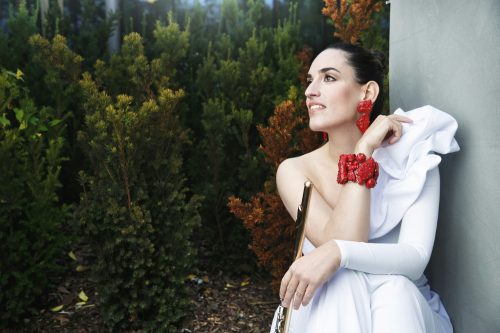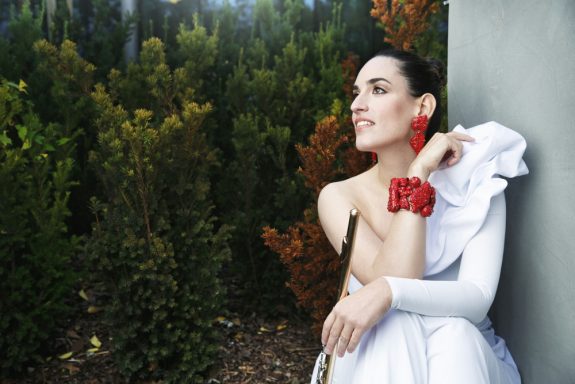 United Kingdom Debussy, Mason, Franck: Noémi Györi (flute), BBC National Chorus and Orchestra of Wales / Gergely Madaras (conductor). Hoddinott Hall, Millennium Centre, Cardiff, 21.6.2024. (PCG)
United Kingdom Debussy, Mason, Franck: Noémi Györi (flute), BBC National Chorus and Orchestra of Wales / Gergely Madaras (conductor). Hoddinott Hall, Millennium Centre, Cardiff, 21.6.2024. (PCG)

Debussy – Prélude à l’apres-midi d’une faune; Nocturnes
Christian Mason – Thaleia (UK premiere)
Franck – Psyche, Part Three
The BBC NOW advertised its outing a fortnight ago as the ‘season closing concert’, so this late addition to the calendar came as somewhat of a surprise, but it was a most welcome programme. It revolved around the summer theme of classical Greek mythology, and the misdeeds of nymphs in particular.
We began with the reticent and beguiling tones of Matthew Featherstone’s mellifluous flute as he launched Debussy’s Prélude à l’apres-midi d’une faune. This was a performance of pure enchantment, in which the orchestra under the careful guidance of Gergely Madaras put not a foot wrong. He even perfectly contrived the tricky matter of the balance of the antique cymbals in the closing bars: there is a danger that they either dominate the proceedings or vanish into sheer inaudibility. The internal balances between plaintive woodwinds and melting strings was sheer bliss.
Madaras took a similar clear-eyed view of Debussy’s Nocturnes. The opening Nuages were contemplative but not immobile; and the splodging string pizzicato in Fêtes struck off neatly against the nicely distanced muted trumpets in the middle section. In the concluding Sirènes, a return to the theme of Greek mythology, the large-scale chorus of women’s voices demonstrated conclusively their superiority over chamber forces. We were treated to the delicate warmth of the quiet singing, and the superlative balance with the orchestra in the more tempestuous passages as the sea surges against the rocks. The ending, with the chorus quietly humming, had a tangibility of sound that for a smaller number of voices would be difficult to match.
After the interval, we heard the first UK performance of Thaleia by English composer Christian Mason. This is a somewhat odd work. The composer’s programme note presents it as a parallel to Debussy’s Prélude in terms of orchestration. In point of fact, other than the references to Greek mythology, the similarities were far from immediately apparent. The concerto – the composer describes the work so – has three movements. They are all generally at a moderate tempo with occasional bursts of speed and virtuosity for the soloist Noémi Györi but share much the same ritualistic atmosphere.
In the opening Lament the solo, on piccolo, found herself in competition with three orchestral flautists who played nearly continuously. She only really cut loose when she rose into her upper octaves. The music proceeded with a series of sustained chords subjected to increasing elaboration and a cadenza. A similar pattern persisted in the second movement Incantation, interrupted by a more elaborate accompanied cadenza where the soloist, now on flute, occasionally flirted with such avant garde techniques as overblowing. In the central section, the cadenza gradually died down into almost total silence, only to resume in much the same manner as before. The final movement Songs without words also laid more emphasis on the meditative aspects of the music than on the sheer level of display that one might have expected of a concerto with the player alternating between flute and piccolo.
The beautifully and elegantly costumed Györi had few moments of repose during the whole of some twenty minutes. She was assured and confident, and her tone was beautifully poised, never tempted to push for a more bravura sound. The composer was present in the hall to receive the appreciative applause of the audience. In the end, though, the music seemed to be over-extended, with insufficient variety of atmospheric mood. Perhaps it would have been safer to regard it as a three-movement tone-poem rather than a concerto. The movements got generic titles but a more detailed programme appeared to underlie the progress of the music.
That was certainly the case with Franck’s massive cycle Psyche, with its five orchestral sections combined with choral interjections. We heard here only the final section following the fatal meeting between Pysche and Eros, which is probably the best-known portion of the score. Indeed, it was disappointing to be deprived of the first two ‘parts’ of the whole epic, with the choral passage which should interrupt the lovers’ idyll suddenly entering unannounced over bald chords and without preamble. The massive climaxes of the final orchestral peroration, too, seemed to be somewhat overblown when we had had no chance to make the acquaintance with the thematic material in earlier, more romantically inflected guise.
All the same, opportunities to hear any part of this work are rare indeed: there are few complete recordings around, as opposed to versions of the purely orchestral sections. So, one is grateful to hear the work given with such enthusiasm and commitment. Oddly, the programme listed the names of the bass section of the BBC National Chorus of Wales, although Franck’s score calls only for female voices and tenors in the choral sections; presumably they bolstered the lower tenor parts in divided sections. The programme more culpably failed to provide either texts or translations. The words are not great literature – the English translation in the vocal score is miserable stuff – but it would have helped to hear what the singers were concerned about.
The concert, we were told, is to be broadcast on BBC Radio 3 as part of their new afternoon series Classical Live. We were not advised of the date of this relay, and perhaps individual items from the programme will be scheduled on different days. Those interested in modern developments in woodwind music will want to hear Mason’s work. The Debussy items will repay the listener who tunes in – either when they are broadcast or on BBC Sounds for thirty days thereafter.
Paul Corfield Godfrey

I agree that Christian Mason’s ‘Thaleia’ was an odd piece – and it lasted much longer than the 20 minutes stated in the programme. It would have been more effective at half the length. The sections where the soloist played pianissimo, and where she was masked by three orchestral flutes, were just plain daft – what’s the point of a concerto if you can’t hear the soloist?
Still, this was an enterprising concert by the BBC NOW.